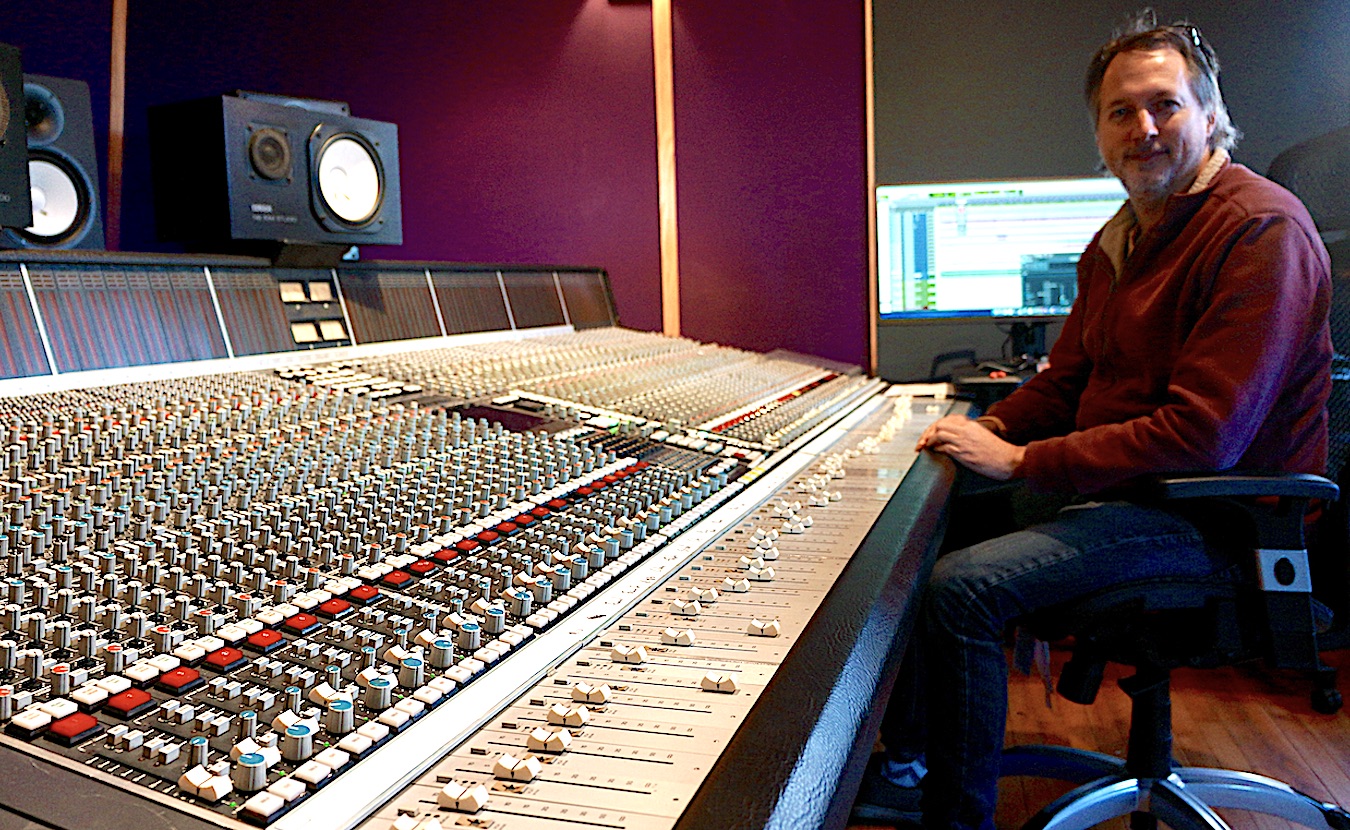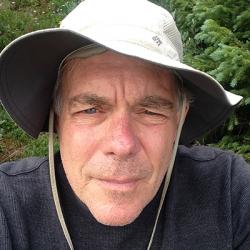Some have speculated that Bloomington has more musicians per capita than anywhere else. The same might be said about recording studios, especially now that high-quality home recording technology is inexpensive and ubiquitous. Despite the game-changing growth of home studio technology, Bloomington still has an impressive number of active professional recording studios.
The pandemic had an immediate effect on musicians who thrive on performing live, but what of the behind-the-scenes studio work that results in digital and physical releases and radio airplay?
The recording studio creative process is not simple. Key production elements are initial tracking (the core parts of a song recorded with musicians in the studio, with each musician recording to a separate track), overdubbing (additional instrument and vocal tracks recorded later), mixing (enhancing and combining all tracks into the finished piece), and mastering (processing the finished mix for maximum audio quality).
The studio alchemy of in-person musical creation guided by producers and engineers is still essential to many artists. During the COVID years, this important piece of Bloomington’s musical ecosystem was hit with many of the same challenges as other businesses.
How do we protect ourselves and our clients?
How do we stay afloat?
How can we change our operation to better fit the times?
How do we reopen?
How do we keep the process of musical creation alive through it all?
To find out how they coped with these unprecedented challenges, I spoke with the owners of four local recording studios: Russian Recording, Noisy Chairs Recording, Airtime Studios, and Primary Sound Studios.
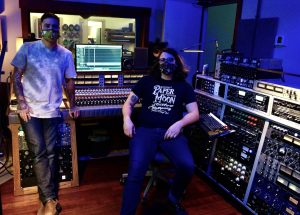
The shutdown of live recording sessions freed time for Mike Bridavsky (left) and Joe Caldwell to work on other projects at Russian Recording. | Photo by Jim Manion
Russian Recording was launched in Brown County in 2003 by owner Mike Bridavsky, then moved to their South Walnut Street location in 2007. Since then, the building has been reconfigured to include lofts for visiting musicians, and the studio’s technical offerings have expanded. Regularly booked by both local and out-of-town artists, things changed quickly in March 2020.
Most of Russian’s staff of engineers and producers had to leave. “It was basically just me and Joe Caldwell here, fully masked all the time,” Bridavsky says. “We started very strict safety rules, everyone had to be masked at all times. We sanitized everything.” With in-person recording sessions gone, he says, “we had to switch gears, so I did some remote mixing and mastering of unattended sessions. Joe started fixing some old microphones. We started refurbishing and selling vintage mics to keep the studio cashflow going.”
To keep the studio active, a new business model was created. “I offered discounted rates for mixing and we pretty much stopped tracking altogether. I mixed the new Major Murphy record and quite a few other records, bands who were remotely recording their own parts. That became a mixing challenge as well. The new Impossible Shapes record was done that way.”
Bridavsky was up for the time-consuming challenge, as were the band members. “There was a lot of arrangement to be done. Jason Groth would have maybe three different guitar parts, Chris Barth would have various keyboard parts and a vocal part, Aaron Deer would add a keyboard part, and Mark Rice would add his drums, percussion, and backing vocals — all from different home studios. I had to figure out where everything was — it was like a total puzzle in many ways. But that’s what was fun. I think that’s what makes the album. I’m finishing up with mixing and mastering on it right now.”
Downtime due to the shutdown of live recording sessions opened up opportunities for studio improvements. Bridavsky says, “The world fell apart and I completely and insanely obsessed over making improvements to the studio. We’d already started rebuilding our console from the ground up. That was an incredible project and now I can’t believe that it’s pretty much done.”
The to-do list of overdue projects he never had time for suddenly became priorities. “Our headphone system needed to be upgraded,” he says. “There were things that we needed for the studio, so I was flipping mics but also acquiring new things. We got a bunch of analog synthesizers, guitar pedals, and guitar amps. We redid all our cabling.
“We did ergonomic stuff like shelves for keyboards and amplifiers and rebuilding the drum closet. Before the pandemic, the studio was great but it was still not my dream studio. During the pandemic I quite literally turned it into my dream studio.”
Russian Recording’s audio output slowed down due to COVID challenges, but not completely. Significant projects besides The Impossible Shapes include Major Murphy, Durand Jones & The Indications, and A Heavy Weight, a true crime podcast series produced by Stacy Bridavsky (Mike’s wife) about the unsolved death of Indiana University student Joseph Smedley.
“Major Murphy’s second record, Access, is out now — which tells us how long the pandemic has been going on if we were able to fully mix, master, and release a vinyl record during this time,” Bridavsky says. “They’re a Grand Rapids, Michigan, band who’ve recorded here before. They’re on the Winspear label, which started in Bloomington. That was a big pandemic project. It was really fun to be able to dig in without the time constraints. Much of the tracking was already done before lockdown, with additional tracks done remotely after.”
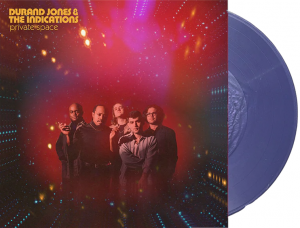
One of the projects Bridavsky worked on during the pandemic was ‘Private Space,’ the latest album by Bloomington-born band Durand Jones & The Indications.
Despite the pandemic, Bloomington-born band Durand Jones & The Indications have really blown up lately, both nationally and internationally. Long connected with the band’s members, Bridavsky found great pleasure in Russian Recording’s involvement with key pieces of their latest album, Private Space. “That was a big one for me,” Bridavsky says. “They came here to write and demo it. It was awesome to see the songs come together. Then they went to New York to record and mix it with [engineer] Ben Kane at his Electric Garden Brooklyn studio, then I got to master it back here [at Russian Recording]. It’s really cool to see the birth of an album happening, then also to be there for the very final touches and hear it all finished.”
With new live sessions now happening at Russian Recording in 2022 (experimental improvisers Ortet has recorded recently, as have Bloomington bands Pasha and The Poms and Secret Mezzanine), Bridavsky anticipates reconnecting with the music scene full-on. “I’m looking forward to everything coming back around. To this day we maintain very strict protocols and we require our clients to be vaccinated.”
“Bloomington is like a big organism, especially on the music scene,” Bridavsky says. “Without bands playing live, there’s a big disconnect between the studio and the music community. Lots of bands are getting excited to finally be able to come in again to record. I look forward to that growing more and really sharing the new improved studio with the community, having it really come alive again.
“There’s nothing that makes me happier than seeing this place get used. We’ve created the space that anyone can walk into and fulfill their vision of what their record should sound like — and have a good time doing it. Nothing brings me more joy than seeing people come in and make records here.”
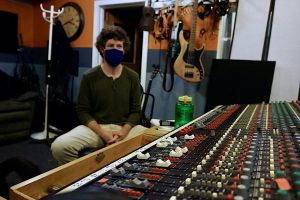
The COVID lockdown started soon after Greg Moore (above) relocated his studio, Noisy Chairs Recording, to a space just south of Bloomington’s courthouse square. | Photo by Jim Manion
Noisy Chairs Recording started up just south of Bloomington in 2014, on Fairfax Road in part of the old Sanders School building. In 2019, founders Greg Moore and Jared Coyle moved their studio into a basement space just south of Bloomington’s courthouse square. Coyle has since relocated to Burlington, Vermont. Moore carries on in these challenging times with his small but efficient project studio, keeping a focus on Bloomington bands and artists.
The March 2020 COVID lockdown brought a halt to the exciting new start Moore was feeling just after relocating. Looking back, he says, “It felt like we had just built the track and the train was starting to go. I definitely felt momentum in this studio space. We were in the middle of recording three different full-band album projects and then it just stopped, that was it.”
“I didn’t even come in here for a while,” Moore says. “I lost my day job, too. I just stayed at home and did nothing. Then eventually, I started coming in and messing around again. But we didn’t have any clients doing anything here right away. It’s a small spot to begin with — it’s not an entourage type of place.”
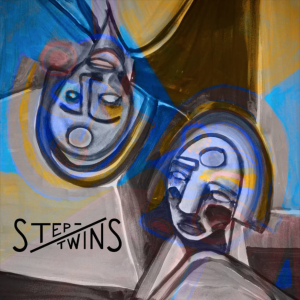
While working with several bands during the pandemic, Moore also completed his solo project, ‘Step Twins,’ which was released on March 18.
After some initial time alone in the studio making improvements to his new recording project, Step Twins, Moore slowly started working with tracking one person at a time on whatever felt safe. “I only did a few mixes and things before people were getting vaccinated. Someone needed to record overdubs for an artist in California. He came in and played pedal steel. Then in early 2021, we eased working together with masks on. We started getting people involved in the three projects I mentioned — SoundR LampN, Thee Vatos Supreme, and my solo project, Step Twins — coming in solo to do vocals in the isolation room. Also, The ShackUps were finishing their new record, Radio Shack. I recorded three vocals that [band member] Chris Kupersmith wanted to redo.”
Having just relocated and rebuilt Noisy Chairs in a new location, Moore wasn’t keen on spending time improving his studio. “It’s one of those things I’ve heard other people talk about — that when you had all that downtime, it’s the thing that you should have done. But to me it just seemed like things felt too weird to do anything. We didn’t do many improvement projects here.”
Stepping out of the new year, current Noisy Chairs projects are wrapping up. “The SoundR LampN record is now recorded, mixed, and ready for the mastering process,” Moore says. “Thee Vatos Supreme, Alexander Lee Mysliwiec’s country band, is making progress on a new album. They just needed to do overdubs, which shouldn’t have taken very long but it ended up taking a year and a half. My Step Twins project is a lot of what I recorded before the pandemic. I’ve been working on improving mixes, that kind of stuff. It’s in the final phase now, and the plan is to put it out on Bandcamp. I’ve got art coming in, mastering should be done soon, and I hope to have it out digitally in mid-March.” (The album was released on March 18.)
Moore is looking forward to getting out to shows again and has been getting a taste of that at the local music hub Blockhouse Bar. “The thing that makes it work for me,” Moore says, “is being able to go to shows and talk to bands and musicians and then be on somebody’s mind when they’re ready to record. Social media is used for that, but I find it to be a weak version of just being present with people. After finishing up these projects we’ve been on, I’m hoping to be able to restart the momentum.”
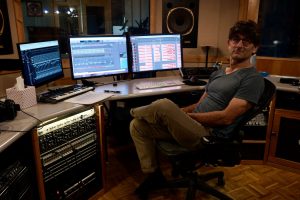
Manion writes that Dave Weber’s Airtime Studios has been critical to the Bloomington music scene for over 25 years. After the initial pandemic lockdown, Weber (above) says they initiated safety protocols as they slowly began working on projects again. | Photo by Jim Manion
In the wilds of northeast Monroe County, high atop a hill on Fish Road, sits the creative complex that has recently become known as The Hundredth Hill. A mix of artist retreat, production workshop, performance space, recording studio, and tiny-house getaway that sprang from the work of musical and life partners Krista Detor and Dave Weber.
The first piece of all this was Weber’s Airtime Studios, a recording space critical to the Bloomington music scene for over 25 years. While the pandemic gave Krista and Dave the downtime to ramp up the Hundredth Hill side of their work, Airtime Studios remained essential to their operation. As everywhere else in March 2020, things screeched to a halt on Fish Road.
On a crisp and sunny winter morning, Dave Weber sits at the controls of Airtime Studios and thinks back. “We had been using the guest houses to serve the studio. Clients would come in to stay and do projects, but we also use them for Airbnb. We shut all that down,” he recalls. “From the get-go, people stopped booking sessions, people stopped coming out. Ladies First, the IU a cappella group, was working on a project then. We did Zoom sessions to mix the project, we were done tracking at that point. With that, I kind of moved straight into Zoom mixing sessions, with clients attending remotely.”
Another Airtime client started working remotely to finish an album already underway. “Moira Smiley, who now lives in Vermont, had tracked a project but needed to mix it. We worked over Zoom and figured out a protocol to make that work. Our internet is limited out here — I can’t stream full bandwidth sessions. So we’d work for a while, then I’d send her an mp3 (audio file).”
Airtime kept things safe from the beginning. “In terms of protocols, we immediately put a notice on our website about being shut down for COVID. For at least the first three months, there was nobody in the studio tracking. Everything was shut down, then in the fall of 2020 it was just starting to ramp up. When we did start opening up to sessions, we cleaned very thoroughly and we had people wearing masks when they were all in the control room together.”
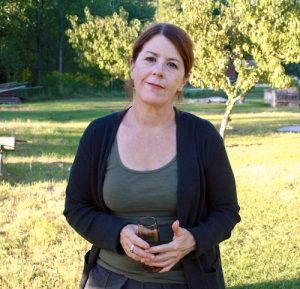
While Airtime Studios remained essential to their operation, Weber and his partner, Krista Detor (above), used the downtime to develop The Hundredth Hill, a mix of artist retreat, production workshop, performance space, and tiny-house getaway. | Photo by Grayson Pitts
As fall turned to winter, Airtime Studios started getting productive again. Weber recalls, “Tim Grimm recorded in November 2020. Monika Herzig recorded in December. Gary Walters, who plays piano with Carrie Newcomer, was in to work on his album project. Craig Brenner was in last winter to do his latest album. We also started working on a new project with Andy Cobine and Linda Manus and their Wizard Party Pants Band. We just finished the album.”
Many of these projects have already been released. “Moira Smiley’s project, In Our Voices, is out,” Weber says. “So is Carrie Newcomer’s most recent project, Until Now, which is gorgeous. Craig Brenner’s album, Passages, was great fun. I loved working on that. Monika Herzig released her The Time Flies album, and we’re working on a new project now. Tim Grimm’s album Gone was released this fall. Also, an artist from Seattle named Wren released an album called Pink Stone: Songs from Moose Lodge.”
Projecting things forward is a mixed bag for Weber — anxious to get back to music with Krista Detor, but still wary of the road. “Krista and I have pretty much stopped traveling and touring. It’s all just too dicey,” he explains. “It still just doesn’t feel worth it at this point. Over the last two or three weeks, you could hear the door slamming again. I just mixed the live stream of the recent Straight No Chaser show from the IU Auditorium. Those guys were like, ‘Yeah, we have thirteen more shows, and we are knocking on wood the whole freakin’ time that we get to make it through this.’ That’s stressful, that’s something Krista and I really don’t want to get into right now. Traveling is going to be a great thing when it gets to the point where there just isn’t all this background anxiety about it.”
Studio-wise, things are easier to imagine for Weber. “Krista has been writing again. I’m looking forward to working on another project with her, and just kind of getting on with it.” But otherwise many things still seem up in the air to him. “Two years in and it’s getting to the point where I wonder how long until it’s endemic and not pandemic. I didn’t think we’d be here two years on, but I’m still wearing masks when I’m out. It’s hard to really think about what I look forward to when it’s over, because I just don’t know when that’s going to be.”
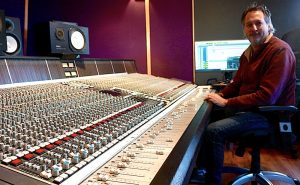
Belser says his studio had several recording sessions scheduled for spring 2020, “but they all got canceled right away. … No one really knew quite what to do early on.” | Photo by Jim Manion
You can’t miss the old church at Mt. Gilead Road and State Road 45 a few miles east of Bloomington. What you might not know is that inside is a high-end recording facility, Primary Sound Studios. Owned and operated by Jake Belser, who’s also a lecturer in audio engineering and sound production at IU’s Jacobs School of Music, Primary Sound has served a genre-hopping range of artists with recording, mixing, and mastering for over 15 years.
At a giant Solid State Logic (SSL) recording console that Primary recently acquired and installed, Belser remembers the impact of the March 2020 lockdown. “There were several sessions scheduled for that spring, but they all got canceled right away,” he says. “We developed protocols for how to deal with some of the cleaning and sanitizing. But no one really knew quite what to do early on.”
Remote mixing and collaborative productions were the key to cash flow early on. “A number of remote mixing and collaborative projects happened, where recording was done elsewhere and then sent to me for mixing or for overdubbing on projects that were already underway,” Belser says. “I probably mixed fifty or sixty songs. It wasn’t until June of 2020 that I really had a live recording session that was more than one person.”
Remote collaboration worked well for Belser and his clients. “One thing that ended up working for me was a program called Listen To,” he says. “It operates as a plug-in on a digital audio workstation [DAW]. You can send audio files to a remote collaborative computer and also receive them, through another DAW or just through a browser on the remote computer. In the case of mixing a band, it was really useful to be able to have the band all log in on Zoom, then I send them a link for Listen To, which is streaming my main mix output from Pro Tools. Then I get feedback from them over Zoom.”
Live, full-band recording sessions started again at Primary in the summer of 2020, long before vaccinations were available. Great care was taken to record a new album with bluegrass band Henhouse Prowlers, Belser says. “As summer hit, everybody kind of stabilized and figured out how to be safe. I did a two-week-long, in-person session with a four-piece band, the Henhouse Prowlers, for their new album The Departure. We all quarantined, not really interacting with anybody, not even going out to the store for two weeks so we could all come in and just be normal. And we did. At that time it was a nice break from being completely isolated.”
With extra time early in the pandemic, Belser also set out to improve the building and his recording technology. “With very few sessions, I first took the time to rebuild the exterior of my building. I ripped off all the soffit and guttering and structurally did some major repairs. For me it was great timing because I could do most of it myself for relatively low cost.
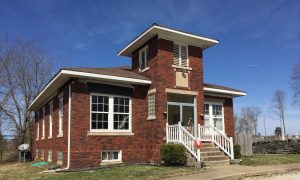
Primary Sound Studios is housed in an old church east of Bloomington on Mt. Gilead Road. With extra time early in the pandemic, Belser made improvements not only to his recording technology but also to the exterior of the building. | Photo by Limestone Post
“Fall semester of 2020, I jumped back into teaching at IU. That occupies a fair amount of time, but I was also doing some sessions here, including some for the university. We adhered to strict protocols with people isolated in rooms singing. In doing those sessions, I realized I was back to staring at screens all day long.”
About the same time, Belser was pondering big changes in his own studio. “There was a certain introspection that I had,” he says, “especially when I was interacting with students with audio and sound on the screen — so many of the decisions I was making in mixing and recording were based upon what I was seeing or what was convenient to access on the screen. I decided that I don’t want to spend the last, say, 15 years or so of my career staring at a screen. It’s going to inevitably be part of it, but if I can find a way to do less of it, that would be good.”
He found that way with a recording and mixing console he’d coveted since he was an audio student himself. “As long as I can remember, I’ve wanted a Solid State Logic console,” Belser says. “Going back to the ’90s, I remember at school there was a poster of the SSL 4000 console — it was just unattainable. As things changed in 2020 and I did some repair work and had more equity in the property, I was able to look at the possibility of purchasing a big console. I found this massive SSL 4000 console for sale in Miami in very good shape physically. Electronically, it needed some work. I ended up buying it and replacing all of the capacitors in it, about 4,300 of them. I hired a team of students in the summer of 2021 to desolder and install new capacitors.”
Once the console was up and running, he noticed other differences, besides not staring at a screen. “Prior to getting the SSL console, I had been finding that doing a project in the computer can sometimes be very slow. The nature of most of the sessions I do tends to be fast paced. I also find that if I’m mixing, the faster I can get to where I want to go, the better the mix is going to sound.”
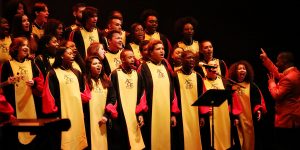
The IU African American Choral Ensemble (above) and IU Soul Review, among others, completed a number of projects at Primary Sound Studios, “using all the COVID protocols,” Belser says. | Courtesy photo
Reflecting back to recording projects since March of 2020, Belser says, “the Henhouse Prowlers album was probably the biggest one that happened. I also did a number of projects for the IU African American Arts Institute and the IU Soul Review that just turned out fantastic. We did a number of songs with the IU African American Choral Ensemble. They’re a big ensemble with eighty people in the choir. We did it in groups of eight or ten with all the COVID protocols. There were a handful other things we did. [Local artists] Ross Martini-Eiler and Matt Romy did projects. Austin Lucas recorded some exciting new stuff that’ll be out in the in the near future.”
Imagining post-COVID reality, Belser is ready to get on with it. “Once we get past this, I look forward to big sessions again, to collaborative music-making in person rather than one track at a time over the internet. There’s a certain back and forth that happens together in a studio, a give and take in developing and creating parts. I definitely look forward to having more and more big sessions of all types in here — big band film scoring, big rock bands, small rock bands, whatever.”
As for ongoing use of COVID production essentials, Belser says, “I don’t see remote work going away. I think a lot of records will continue to have basic tracks with the majority of the band recording together in-person. But now, everyone can more easily record a special guest or a band member from a remote location doing overdubs. I think one of the biggest things that came out of all this for a typical musician is that everyone bought better gear for recording. Everybody has a decent interface and a decent microphone now, and they know how to share files.”
The Bloomington sound continues
Far from throwing in the towel, these studio owners have adapted to the challenges of the past two years and are itching to move forward however they see best. Their commitment to the Bloomington music scene is intact and their service to local music creation will continue to bring the eclectic Bloomington sound to the world. By any means necessary.
 Publisher’s note: This article is part of a series on how local artists and arts organizations have been affected by the pandemic. It is made possible in part by a grant from the Bloomington Arts Commission, the Bloomington Urban Enterprise Association, and the Zone Arts Grant Program. We thank them for their support!
Publisher’s note: This article is part of a series on how local artists and arts organizations have been affected by the pandemic. It is made possible in part by a grant from the Bloomington Arts Commission, the Bloomington Urban Enterprise Association, and the Zone Arts Grant Program. We thank them for their support!
You can help support local writers, photographers, illustrators, videographers, and others by donating to Limestone Post. Thank you!

